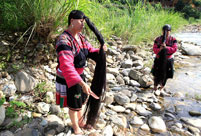

Frank Quan(left)
Frank Quan, the last remaining shrimper of China Camp, a community established by Chinese immigrants in the mid-1800s, died on August 15. He was 90 years old, and would have been 91 years old on August 25.
He was found by his friend in his cabin in the camp. Born and raised in the camp, he spent most of his life there, witnessing the ups and downs of the village.
China Camp has a history of over 150 years. After the discovery of gold in California’s Sacramento Valley in 1848, thousands of Chinese immigrants arrived. Data shows that there were only three Chinese residents in California in 1848, but that number increased to 30,000 by 1852. The population influx and exhausting surface claims/the system of “staking claims” disappointed newcomers, and Chinese laborers were driven out.
Together with other Chinese laborers driven away from railway construction, Chinese immigrants became cooks, laundrymen, and servants. But some of them moved to San Pablo Bay and turned to commercial shrimp fishing, establishing China Camp on the shore of San Pedro Bay.
In 1875, 26 China Camp communities were founded in the bay area, and they reached their height in the 1880s, with 469 residents. Some of the shrimp they caught was sold to local restaurants, but most was sun-dried and exported to China. More than three million pounds of shrimp were caught annually from the late 1800s to the early 20th century.
This all changed after the passage of the Chinese Exclusion Act in 1882. Over the next few decades, additional discriminatory exclusion laws were passed, making life difficult for the camp’s shrimp fishers. In 1905, the U.S. banned shrimp exports, striking a severe blow to the China Camp economy. In 1911, the fishing nets widely used by the Chinese were prohibited. As a result, the population of China Camp declined dramatically.
Quan Hung Quock, grandfather of Frank Quan, was an early inhabitant of China Camp. After moving to the camp from San Francisco’s Chinatown he built a general store there in 1895. Thirty years later, Frank Quan was born.
During World War II, Quan served in the Navy as a signalman.
The shrimp fishery industry once again thrived in the 1930s and 1940s, but on a much smaller scale. Only a small community centered on the Quan family remained. The Quan family continued shrimp fishing and ran a small restaurant.
In 1977, China Camp was transformed into a state park and the 36-acre village was preserved as a living memorial. Frank Quan was the only person permitted to reside in the park. He shrimp fished sometimes and did some maintenance work.
The park was almost closed twice due to budget crises facing the state of California in 2008 and 2011. With great effort and help from legislators and volunteers, the closures were averted. “Friends of China Camp,” a non-profit organization, signed an operating agreement with the California state park system to keep the park open.
Quan never married his whole life. He just operated his small restaurant would and even prepare clam chowder on the weekends for visitors.
Ren Faqiang, Chinese deputy consul general in San Francisco, visited him on August 12, just three days before his death. The next day, Quan told Heidi Kuhn, the granddaughter of California land magnate, entrepreneur and civic leader John A. McNear: “Officials from my country of origin visited me, listened to my stories, and gave me Chinese tea: I am contented.”
Heidi Kuhn says that Mr. John A. McNear rented land to early Chinese immigrants for just one US Dollar in the 1870s. That’s the beginning of China Camp.
Now, the last shrimper of the camp is gone.
 World's fastest bullet train to start operating next month
World's fastest bullet train to start operating next month Huangluo: China's 'long hair village'
Huangluo: China's 'long hair village' Spectacular bridge with one of the tallest piers in the world
Spectacular bridge with one of the tallest piers in the world Magnificent view of Hukou Waterfall
Magnificent view of Hukou Waterfall A glimpse of Stride 2016 Zhurihe B military drill
A glimpse of Stride 2016 Zhurihe B military drill US Navy chief tours Liaoning aircraft carrier
US Navy chief tours Liaoning aircraft carrier Chinese American woman wins Miss Michigan
Chinese American woman wins Miss Michigan Centenarian couple takes first wedding photos
Centenarian couple takes first wedding photos Traditional Tibetan costumes presented during fashion show
Traditional Tibetan costumes presented during fashion show Top 10 livable Chinese cities
Top 10 livable Chinese cities Top 20 hottest women in the world in 2014
Top 20 hottest women in the world in 2014 Top 10 hardest languages to learn
Top 10 hardest languages to learn China’s Top 10 Unique Bridges, Highways and Roads
China’s Top 10 Unique Bridges, Highways and Roads Japan’s hi-tech Olympic teaser amazes China, despite Abe
Japan’s hi-tech Olympic teaser amazes China, despite Abe Former energy boom town learns hard lessons about service economy
Former energy boom town learns hard lessons about service economy Transformation of China’s largest State-owned bookstorechain is painful but promising
Transformation of China’s largest State-owned bookstorechain is painful but promising Can Chinese TV shows recapture their former glory in SE.Asia?
Can Chinese TV shows recapture their former glory in SE.Asia?Day|Week